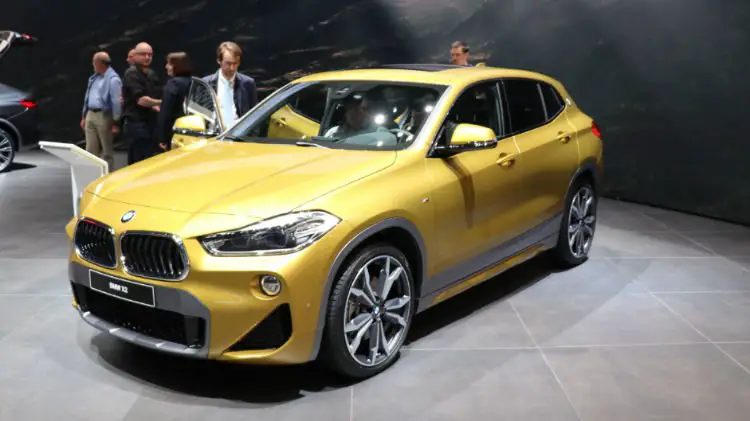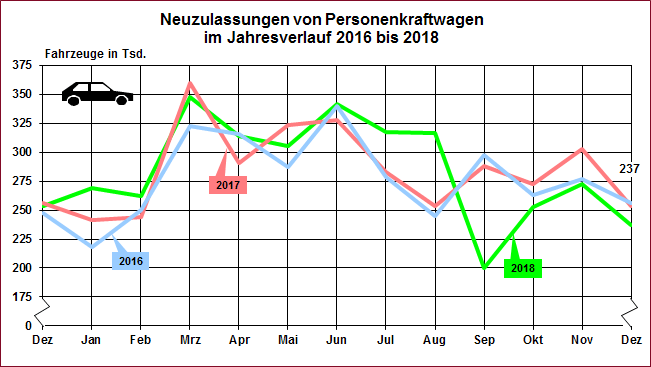In 2018, new passenger vehicle registrations in Germany were flat (-0.2%) with 3,435,778 cars sold. The total motorized vehicle market expanded by 0.6%.

in 2018, the German new passenger car market exceeded 3 million cars for the fifth consecutive year despite a very small contraction largely due to new emission regulations that led to the inability to register some new cars during the final quarter of the year. The total German new motorized vehicle market expanded slightly in 2018 to 4,025,514 vehicles with increases in motorcycles and heavy vehicles.
German New Motorized Vehicle Market in 2018 (Full Year)
Total new motorized vehicle registrations (Kraftfahrzeuge) in Germany in 2018 increased by 0.6% to 4,024,514 vehicles. Passenger cars (PKW) are by far the largest component of the motorized market in Germany. However, the continued growth in the sale of heavy commercial vehicles hints at continued strength in the German economy and that the small contraction in car sales is largely due to the new WLTP regulations and thus should be temporary.
According to the KBA, the composition of the new motorized vehicle market in Germany in 2018 was as follows:
| Category | FY2018 | FY2017 | % Change |
| Motor Cycles | 158,258 | 143,885 | +10.0 |
| Cars (PKW) | 3,435,778 | 3,441,262 | -0.2 |
| Buses | 6,687 | 6,697 | -0.1 |
| Trucks (Lorries / LKW) | 321,966 | 306,609 | +5.0 |
| Tractor Units (Zugmaschinen) | 82,923 | 85,414 | -2.9 |
| – of which Semi-Trailer (Sattelzugmachine) | 38,727 | 37,606 | +3.0 |
| Other motorized vehicles | 18,902 | 18,234 | +3.7 |
| All Motorized Vehicles (Kraftfahrzeuge zusammen) | 4,024,514 | 4,002,101 | +0.6 |
| Trailers | 307,085 | 306,883 | +0.1 |
| Source: KBA |
New Passenger Car Sales in Germany by Month in 2018
The German new passenger car market was mostly in positive territory in 2018 but the introduction of new emission control regulations left many manufacturers unable to register new cars during the final four months of the year. The whole market for the year only turned negative in December but the effect of lower registrations weighed heavily on the market from September onwards.
New passenger vehicle registrations in Germany per month were as follows during the past three years:

New Car Sales in Germany by Year
Although new passenger vehicle registrations in Germany were 0.2% lower in 2018 than in 2017, the German new car market still exceeded 3 million vehicles for the fifth consecutive year.
The very small contraction in the German new car market in 2018 was largely due to the introduction of new WLTP emission regulations that left many car manufacturers unable to register some new cars. Volkswagen was strongly affected while Audi and Porsche were hit particularly hard with registrations sharply down during the final four months of the year.
The small contraction also followed a very strong 2017 when new car sales in Germany were at their highest level since 2009, when special measures were introduced to encourage the market.
New passenger vehicle registrations in Germany in recent years were as follows:
| Year | German Car Sales | % Change |
| 2018 | 3,435,778 | -0.2 |
| 2017 | 3,441,262 | 2.7 |
| 2016 | 3,351,607 | 4.5 |
| 2015 | 3,206,042 | 5.6 |
| 2014 | 3,036,773 | 2.9 |
| 2013 | 2,952,431 | -4.2 |
| 2012 | 3,082,504 | -2.2 |
| 2011 | 3,173,634 | 9 |
| 2010 | 2,916,260 | -23.4 |
| 2009 | 3,807,175 | 23.2 |
| 2008 | 3,090,040 | -1.8 |
| 2007 | 3,148,163 | -9.2 |
| Source: KBA |
New Passenger Car Registrations in Germany in 2018
New passenger vehicle registrations in Germany in 2018 decreased by 0.2% to 3,435,778 cars – only 5,484 cars fewer than in 2017. The total changes in car ownership registrations (Besitzumschreibungen) in 2018 was 1.5% lower than a year ago at 7,192,411 cars.
More data released by the KBA on new car resgistrations in Germany in 2018:
- 63.6% (-1.3%) of new cars were registered by businesses and 36.4% (+2%) privately.
- Petrol engines took a 62.4% share of the market compared to 57.7% in 2017.
- Diesel cars took a 32.3% of the German new car market compared to 38.8% in 2017.
- Hybrid cars had a market share of 3.8% with 130,258 registrations (+53.8), including 31,442 (+6.8%) plug-in hybrids.
- 36,062 (+43.9%) of new cars were electric for only 1% market share.
- The most-popular car colors in Germany remained grey (including silver) at 29.5%, black (24.8%) and white (20.9%).
The most important market sectors for German new car sales in 2018 were:
- 22% compact, e.g. VW Golf
- 18.3% SUV, e.g. VW Tiguan
- 14.5% small, e.g. VW Polo
- 10.9% midsize, e.g. VW Passat
SUVs sales grew by 20.8% in 2018 – the fastest growing market segment in Germany with a larger market share expected as more smaller crossover vehicles are coming to the market.
More on the German Car Market in 2018
- 2018 Germany: Overview of the German New Car Market
- 2018 Germany: Best-Selling Car Brands
- 2018 Germany: Best-Selling Car Models
- 2018 Germany: Best-Selling Electric Car Brands and Models
- 2017 Germany: Development of the German New Car Market
- 2016 Germany: Development of the German New Car Market
- 2019 – Total Number of Cars on German Roads
